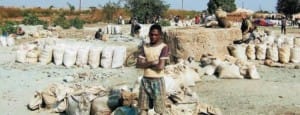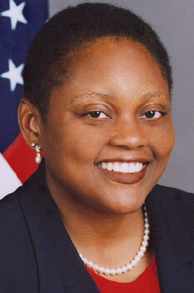by Ann Garrison

He said that the State Department had invited him, the student coordinator for Friends of the Congo, and members of other NGOs to the State Department for an off record briefing on Friday, Nov. 19, where Frazer said, in so many words, that there’d be no change in U.S. policy in Congo or Rwanda.

1) Keep arming puppet Rwandan “President” a.k.a. dictator Paul Kagame’s Rwandan army to wage unacknowledged war by shelling and firing across the Rwandan-Congolese border and, by stealth, in Eastern Congo.
2) Keep arming U.S. and Rwandan tool, terrorist Gen. Laurent Nkunda, in support of U.S. imperial interests and those of its Anglo allies, Britain, Canada and Australia, and its French-speaking ally, Belgium.
3) Maintain a large U.S. military base in Kigali, Rwanda, often staffed by African-American military personnel, for the sake of appearances, just as the U.S. State Department and its Department of African Affairs is staffed by African-American women Condoleezza Rice and Jendayi Frazer, for appearances.
(Imagine how much worse it would look if a white male had summoned Kambale and other Congo advocates to this press conference, just to tell them all to get used to the ongoing African holocaust.)
4) Keep writing sweetheart trade agreements between the U.S. and Rwanda, which are essentially sweetheart trade agreements between U.S. military industrial and corporate interests and Rwanda’s puppet elites.
5) Make the people of both Rwanda and Congo continue to suffer for the sake of Congolese minerals smuggled out of Congo to supply U.S. corporations, including the U.S. military-industrial machine, with “geostrategic” minerals.
I know how maddening and infuriating this press conference must have been for Kambale but, considering how much is at stake in Congo – the security of the U.S. military industrial machine itself and that of other U.S. corporations dependent on Congo’s mineral wealth, especially the electronics industries – it’s hardly surprising.
The U.S. military and the U.S. military-industrial machine are the largest and most lethal state-corporate force in the history of the world. Will they give up their hold on Congo’s geostrategic mineral wealth, more important even than petroleum, without a huge battle, a battle I really can’t even quite imagine? This seems to me like a far larger battle than ending apartheid in South Africa.
Consider cobalt
Consider cobalt, a mineral richly abundant in Congo and very few other parts of the world. Consider Congo’s cobalt riches alone.
Cobalt is used to make steel; it is absolutely essential to the manufacture of most U.S. weaponry I can think of, short of biological and chemical weaponry, and including jet engines, missiles and tanks.
Cobalt is also essential to the construction of natural gas power plants and automobile engines.
Consider the U.S. Congressional Budget document about cobalt, produced way back when the Democratic Republic of Congo was still Zaire. This document, “Cobalt: Policy Options for a Strategic Material,” stated that:
1) The richest, most plentiful cobalt deposits in the world are in Zaire – now called Congo-Kinshasa or the DRC – in the Katanga Copper Belt running through Congo-Kinshasa’s Katanga Province and across one of its southeast borders into Zambia.
2) Some of the only other known deposits are in Russia, then the Soviet Union.
3) Cobalt deposits in the U.S. are so sparce that mining and refining them would be very difficult and unprofitable, but that the U.S. government has considered subsidizing domestic cobalt mining and refining of our very scant and poor cobalt ore because cobalt is so essential to U.S. manufacture in time of war.
4) The U.S. must be prepared to go to war to secure geostrategic minerals, including cobalt, which are essential to war production and to the U.S. economy.
This Congressional Budget Office, document produced in 1982, cites “the possible need to wage a war in the absence of foreign supplies of cobalt.”
This is what the U.S. has done, gone to war in Congo. This is a U.S. proxy war; the U.S. uses Kagame, the Rwandan army and terrorist Gen. Laurent Nkunda as their African proxy force in Congo, but this is war. It has been the deadliest, though barely reported, war on the planet for years.
Again, I totally understand Kambale’s fury at having wasted last Friday afternoon being blown off in a briefing with the likes of Jendayi Frazer.
Kambale is a civil engineering student at North Carolina State Agriculture and Technical College. He hopes to be able to return to Congo one day to build infrastructure, desperately needed roads, hospitals, schools, clean water and electricity delivery infrastructure to enable the Congolese people to live.
This makes me want to scream too. How dare Jendayi Frazer waste Kambale’s time spouting imperial propaganda?
However, any of us calling for an end to savage imperial exploitation in Congo have to keep in mind that we’re advocating for the end of the deadliest war on the planet now. The death toll is between 5 and 6 million since 1997 alone; the International Rescue Commission estimated 5.4 million last year, excluding the first year of what many call the African World War.
And the death toll continues to rise at a rate of 45,000 a month. The numbers of internally displaced people are now estimated at 1 million in North Kivu Province alone, including another 250,000 displaced since August, when Gen. Nkunda, the U.S. and Rwanda’s psychopathic tool in Congo, began his latest rampage, took control of North Kivu Province and began threatening to overthrow all Congo-Kinshasa, the DRC.
This is the deadliest war on the planet, waged by the largest, most lethal military force in the history of the world, the United States of America, even though with an African proxy army.
I think we have to keep trying to tell more Americans and more of the world outside the U.S. State Department that the war in Congo is not only all-out war but also the deadliest war on the planet, that, though barely reported, it has been the deadliest war on the planet for many year now.
Barack Obama is about to be handed responsibility for an ongoing African holocaust in Congo that is not of his making. The Congressional Budget Office document I cited, stating that the U.S. must be prepared to go to war for Congo’s geostrategic minerals, essential to U.S. military industrial production, was drawn up in 1982.
The state-corporate military industrial apparatus launched the U.S. imperial war on Congo many years ago when it conspired with that of Belgium, Congo’s former colonial oppressor, to assassinate Patrice Lumumba in 1961.
There are so many layers of state, corporate and military institutional bureaucracy and literal force behind the U.S. imperial war for Congo’s resources, the task of making it known is so enormous and overwhelming that all I can do myself, without gasping helplessly, is to think about how we might act locally here, in my community, the San Francisco Bay Area, and through wider networks like Kambale’s, like Friends of the Congo, Stop Africom and even the fledgling international Facebook group which Kambale and I started here several weeks ago, “Break the Silence on the U.S.-backed Rwandan Invasion of Congo.”
I have a few thoughts about how we might act locally or in wider solidarity, even in the face of so much. But first, I think we have to keep pointing out that Congo’s war is an imperial resource war, in which the U.S., using Rwanda to control Congo, is by far the most lethal, highly armed and savage aggressor.
Then, perhaps, we can ask ourselves how we might act locally and even how we might pressure the Obama administration, daunting as all this is, about as daunting as it could possibly be.
I don’t believe that Barack Obama or those who backed him – in many cases, idealistically – want to see the ongoing African holocaust in Congo become the first African-American U.S. president’s legacy.
San Francisco writer Ann Garrison can be reached at annie@thepriceofuranium.com.






